The socilinguistics behind Cultural Capitulation
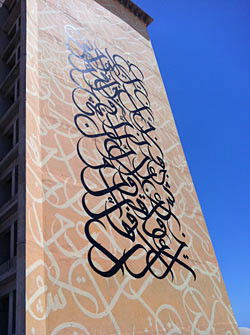
Having endured the compromising life in a previous-colony-current-diglossic society, my battle and purpose is to challenge the current status quo and to catalyze a paradigm shift. My firm belief is for an official Tunisian language to be the first step towards healing post-colonialism trauma and unconscious self-loathing. It may bring about true liberty and independence. It shall bring about change. My chances are slim but I am taking them head on. So, let us dive in.
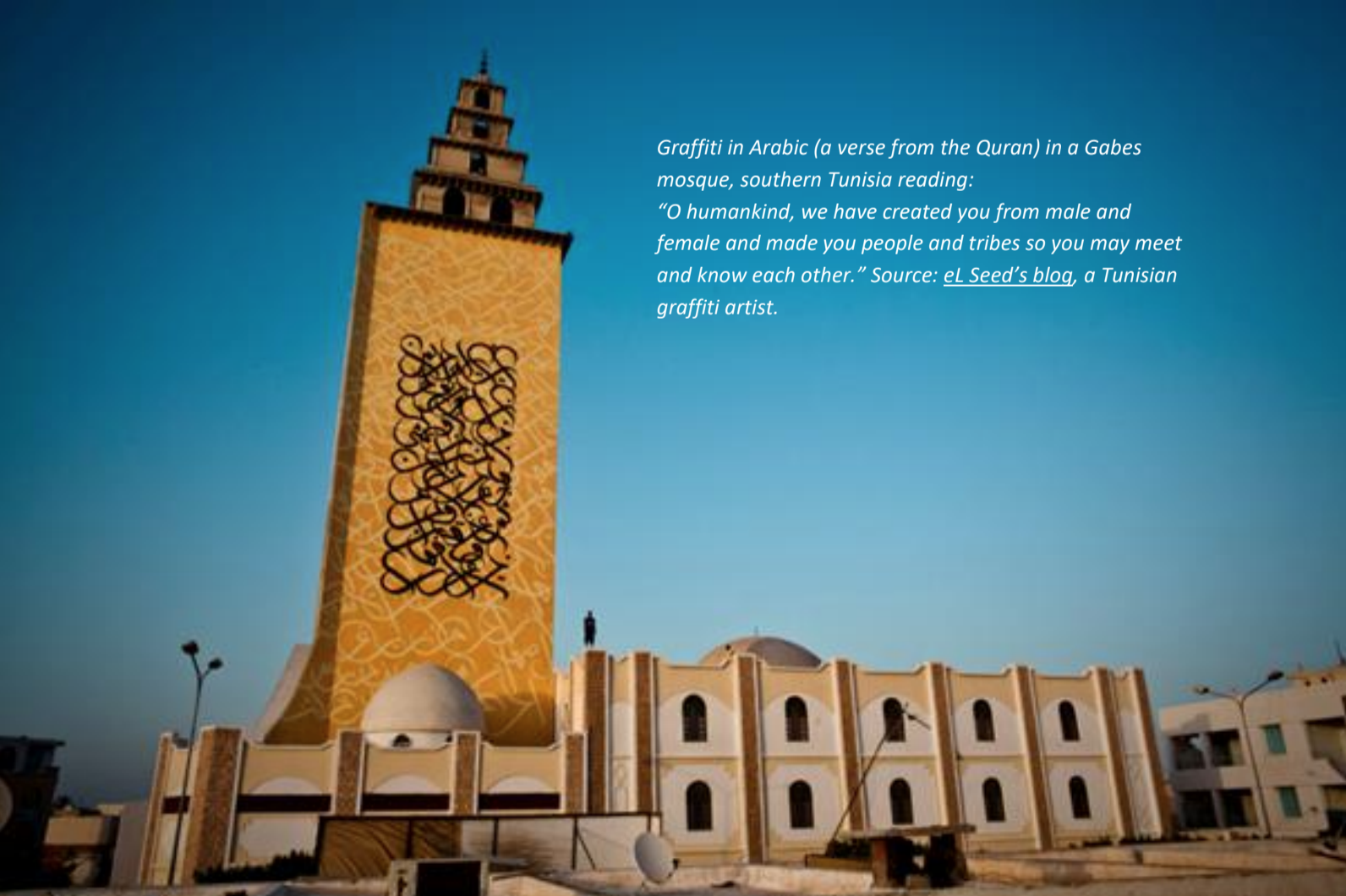
Diglossia situation in Tunisia
In Tunisia, different spoken languages indicate different social status.
- Speaking Tunisian / local vernacular is almost vulgar, definitely blue-collar.
- Speaking Standard Arabic (official language of Tunisia) is solemn. It conveys righteousness and conservatism (Tunisians elected president chose not to campaign and only communicates in literary Standard Arabic. Reasons cited by voters to pick him were his high ethics and trustworthiness although most simply do not understand him).
- Speaking French (lingua franca, unofficial, the language of all higher education scientific classes) conveys privilege and high social ranking.
- Recently, English is gaining ground as the upcoming modern / geeky / sophisticated / liberal Gen Z lingua franca.
The Tunisian diaspora also counts extinct / nearly extinct languages. These are the Tamazight languages of the Berber: the predominant genetic group in Tunisia. Berber make up 80% of the total population (source & further reading). The Sened Tamazight once spoken in the region of Gafsa has completely disappeared.While in 1911, the entire region spoke the language only the elderly did in the late sixties. East Zenati has also functionally disappeared surviving merely through isolated towns in the desert and islands (Chenini, Matmata, Djerba).
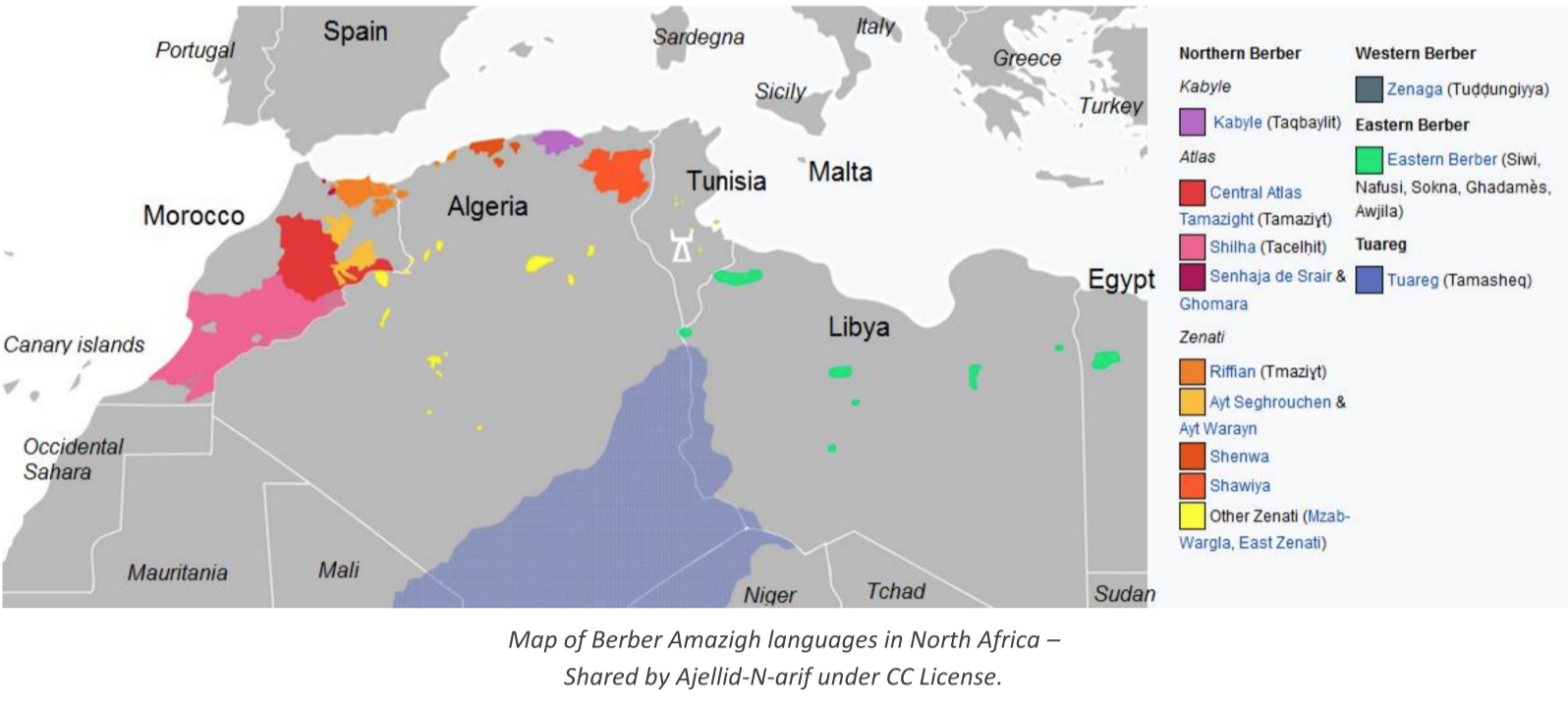
Currently, people text, post and message on social media using the above-mentioned languages expect Tamazight. When communicating in Tunisian, two ways are possible:
- Majority of millennials & Gen Z use a combination of Latin letters (ease of access in smartphones and keyboards) and numbers. Numbers replace letters of Semitic origins that do not exist in roman alphabets (i.e., 3 for Protosemitic /ʕayn/, 7 for /ħ/, 9 for /q/).
- Majority of Baby Boomers & Gen X use Arabic letters.
A combination of both methods also occurs enabled by smartphones with handy multiple keyboards.
This suggests confusion as opposed to multilingualism (i.e., Quebec, Canada being the perfect bilingual setting). Having to speak Arabic for official matters and French for Academia induces unnecessary hurdles. Communicating forcibly in a different language than one’s mother tongue exposes people to unnecessary chronic tension and mental depletion. Often than not, Tunisians end-up unable to master any of the languages above.
They have to constantly switch languages to get a message across. They lose a great deal of “social lubrication” and subsequent “self-determination” that usually stem from deep conversations, eloquent conceptualization, art and literature.
Like all diglossic societies, Tunisia ranks at the bottom when it comes to the total number of published books per capita (I am currently working on a paper addressing this matter).
Among Tunisian college graduates, a complete command of either or both lingua francas (i.e. Arabic and French) is rare. (No official statistics exist. I am urging competent people to help gather / publish data around the subject).
Socially, despite a relatively small territory, unrest and divide is perpetual. People are unconsciously inclined towards racist thinking patterns where one’s accent / command of a given language determines his worth and worthiness. This was exacerbated by multiple colonial eras (most recently and importantly for current communities the French colonial era) imprinting imported racist ideologies in common psych – i.e. the lighter a skin color the better; family names determine status in a cast-like setting, strong accent bears ignorance.
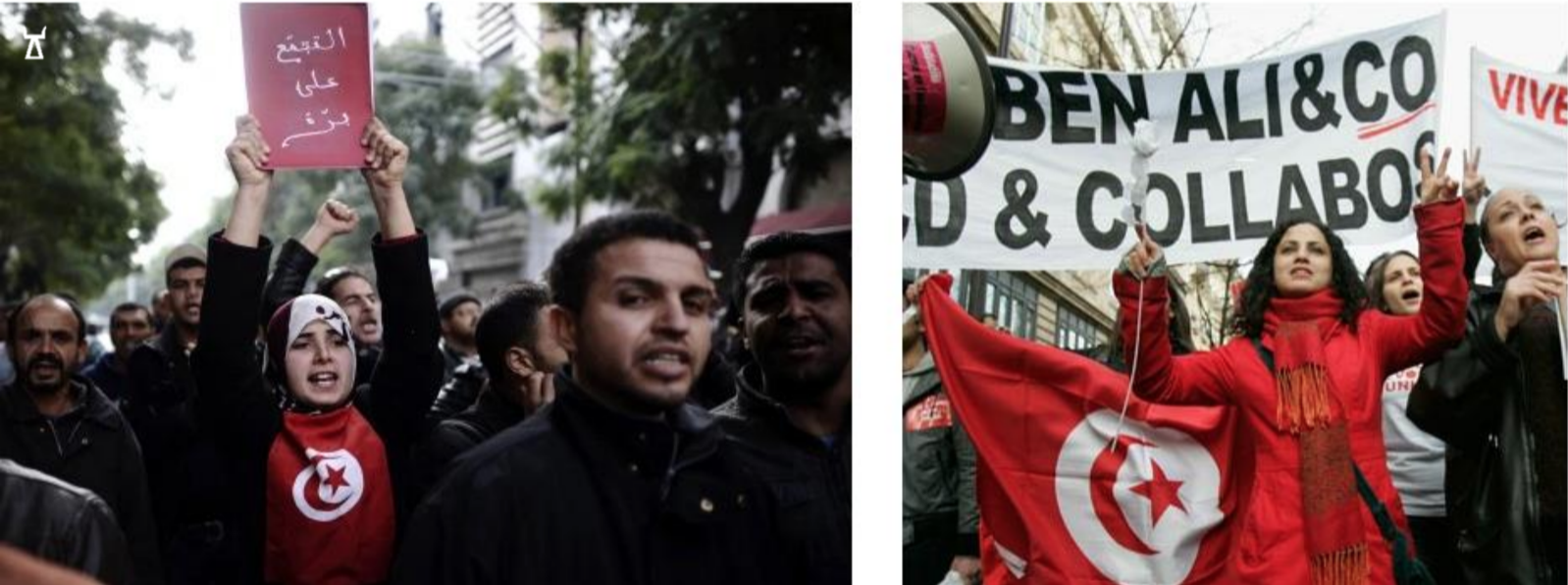
Tunisians protesting authoritarian regime and inequalities in 2011. Apparent contrast between two different social classes despite embracing the same appeal. Left: banner in Arabized Tunisian urging previous president Ben Ali’s party [RCD] to “get out”. Right: banners in French with the same message "Ben Ali & Co, [RCD] & Collabos". (Source: compiled from GETTY & FP)
Diglossia shattered unity in Tunisia breeding social disparities and rubbing salt in open wounds (i.e. post-colonialism trauma and unconscious self-loathing). The significant damage cannot be undone without brave actions in the right direction. My firm belief is for an official Tunisian language to be the first step towards healing. It may catalyze true liberty and independence. It shall bring about change.
The latest episode of colonialism in Africa
The situation in Tunisia greatly resembles that of Africa where the entire continent came under colonial rule (with most under slavery as well) in the previous centuries. Ironically, Africa got its name from the Roman “Africa” province that roughly corresponds to modern-day Tunisia after the tragic fall of Carthage (further reading).
Colonies got “independence” by the late Mid-XXth century. Paradoxically, the previous “colonial” languages were officialized instead of local lingua francas. They usually convey privilege and high social status (Portuguese in Cape Verde, French in Tunisia, Morocco, Guinea, and Mali to name a few).
None of the previous colonies in Africa got rid of the psychological back-to-back traumas of slavery then colonization. I believe that the current status quo (i.e. previous enslavers language kept official) is the continuum of colonialism.
Unity has not been possible even after “independence”. Politically, this partially explains the post-independence bloody civil wars that ravaged Africa killing millions of people. Scores were usually settled by previous colonists. Authoritarian regimes promoting dictatorships and presidencies for life were instituted in most African ex-colonies by the previous invaders – especially by France.
Until as late as 2020, France has openly engaged in insurgence / manipulation / corruption / officials bullying and subsequent killing scandals in the African continent and beyond it. Known occurrences are documented in Côte d’Ivoire, Burkina Faso, Mali, Gabon, République Centre-Africaine, Guinea and Lebanon to name a few.
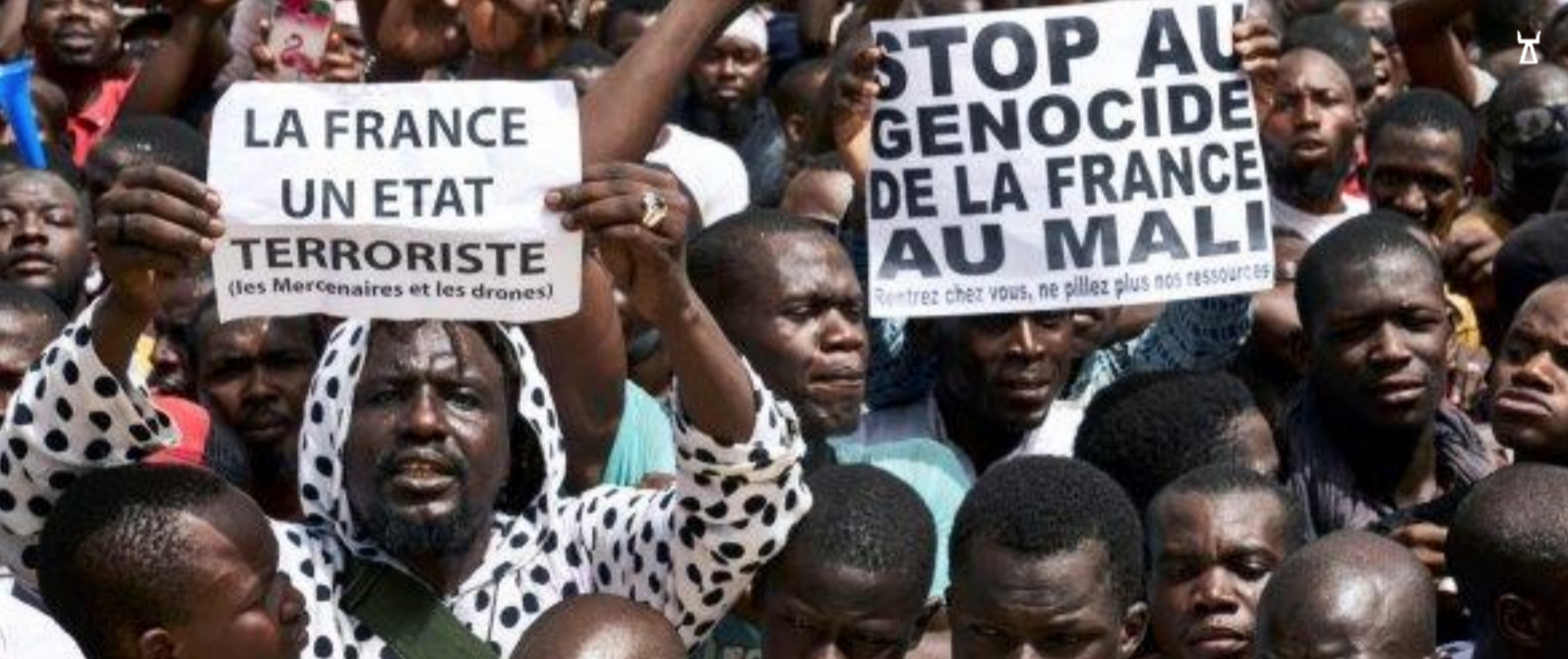
Thousands of Malians take to the streets of Bamako in Jan 2020 to protest the French military presence. Mali is a West African country counting 80 national languages. Only French is declared official despite it being spoken by 20% of the population. After Mali’s independence, the first president ruled from 1968 to 1991 and enjoyed French citizenship (i.e. Modibo Keita). Ever since, several coups d’état took place. France is accused of perpetuating unrest and co-plotting the recent terrorist attacks in Mali to justify its presence and continuous insurgence out of sheer greed.
Economically, since French was systemically forced as official language, all ex-French colonies rely on France as an “economic partner”. The term “partner” here is as deceiving as the term “protectorate” used by colonial France’s propaganda to justify the atrocities of slavery, plundering of resources and genocides (further reading: Tutsis genocide in Rwanda).
Today, these countries import most of their goods exclusively from France. Even products not manufactured in France are sold through French customs for royalties justified to the west by France’s ability to communicate in their official language.
Fourteen countries in West and Central Africa still use an obsolete French currency called "Franc CFA", literally "Franc des Colonies Françaises d'Afrique" (translates to "Franc of French Colonies in Africa") - indexed by France to the Euro.
Their combined GDP is 222 Billion USD in 2018 (some 8% of France’s GDP) mostly flowing through / kept in Banque de France.
Change is halted through systemic indoctrination, corruption of officials, support of dictatorships, lobbying to institute endless bureaucracies as opposed to direct democracies.
Culturally, many lost their native languages and distinctive traditions deemed bizarre, inappropriate, misogynous, insanitary and/or barbaric by colonizers standards.
Examples are multiple and can make the subject of future research.
- Tagelmust of Tuareg: the blue veil worn by women and men for protection and discretion in a culture that considers revealing one’s face to strangers offending. This is being prosecuted, even banned in Europe through the work of organizations like the French “terre des femmes” citing reasons like resisting an “Islamic invasion” and empowering / liberating women by battling a symbol of sexualization in minors (source & further reading).
- Otjize beauty rituals for Himba women in Namibia: for centuries, Namibian women decorated themselves with a reddish mixture of paste of butter, red ocher and fat called Otjize to refresh and decorate hair and skin. Today, store-bought imported beauty creams have replaced Otjize that only prevailed in remote areas – usually despised by “modern” Namibians as unsanitary.
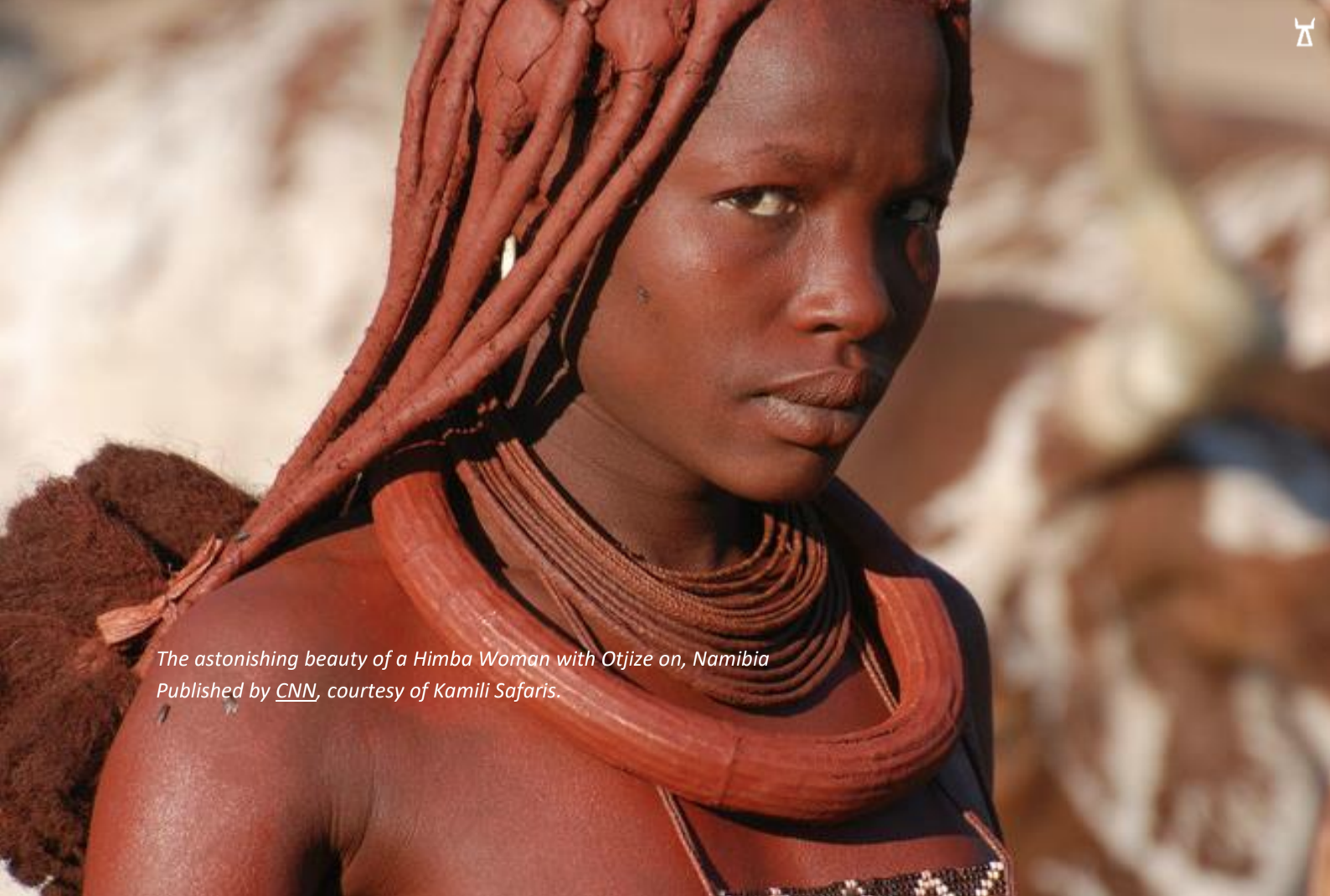
Although culture openness is paramount for its subsistence, diglossic societies in Africa endure what I call “cultural capitulation”. We are witnessing a complete and utter dependency as opposed to openness. People were long forced to concede parts of their culture. Today, they are self-sabotaging their uniqueness to unconsciously please “modernity”.
My focus is the implications behind it. I believe that diglossia are holding entire cultures back. They are holding the human race back in a process that disturbingly resembles slavery and colonialism.
Malta – A sociolinguistic contrast
An interesting contrast exists between the situation in Tunisia and Malta. Maltese (official language of Malta, a tiny Island in the middle of the Mediterranean, 250 miles away from the shores of Tunis) is a close language to Tunisian both having the same “ancestor” (i.e. Maghrebi Arabic of Semitic Origin).
Maltese resembles Tunisian to the extent of it being understood by Tunisians with no need for schooling. (source & further reading).
Maltese scholars claim that Maltese evolved from Siculo-Arabic, a now extinct language once spoken in Sicily (170 miles away from Tunis). Historically, Maltese, Sicilians and Tunisian were the same people (i.e. roman Africans) for centuries before historic events set them apart – Arab, Ottoman then French centuries long colonization; Arabization & islamization of Tunisia.
Malta is now a thriving economy and a tourist / immigration destination. Peace prevails and the country enjoys substantial economic growth (source & further reading) despite a huge lack of natural resources – unlike diglossic African countries.
The Maltese language is the only language from the Maghrebi Arabic family that enjoys official status.

Old town Malta (left) and Old tow Tunis (right). Both are called “M’dina” (Tunisian for town).
Compiled from TourRadar tourist brochures.